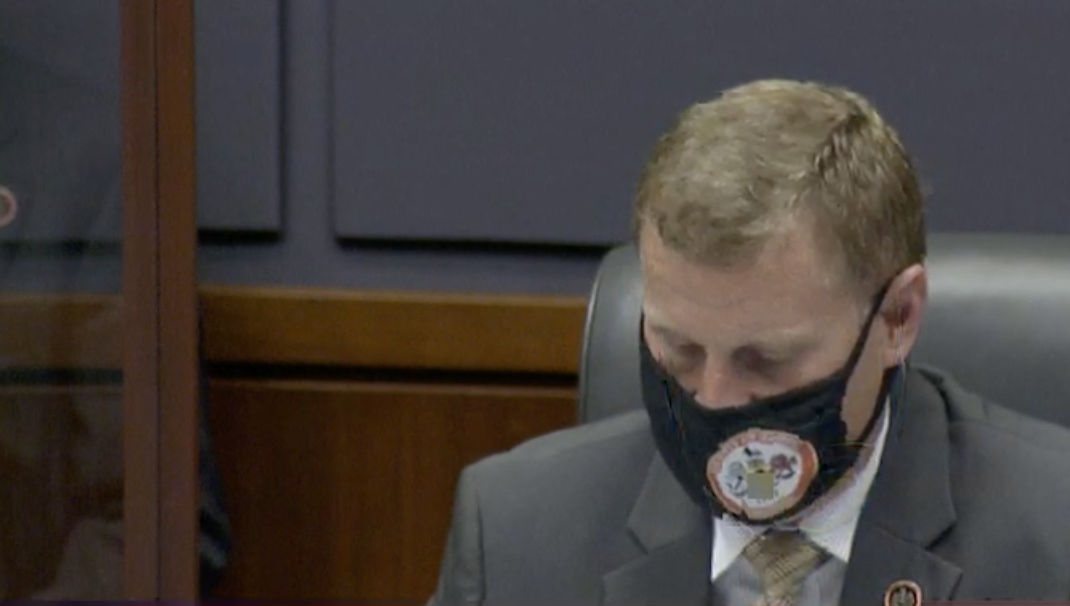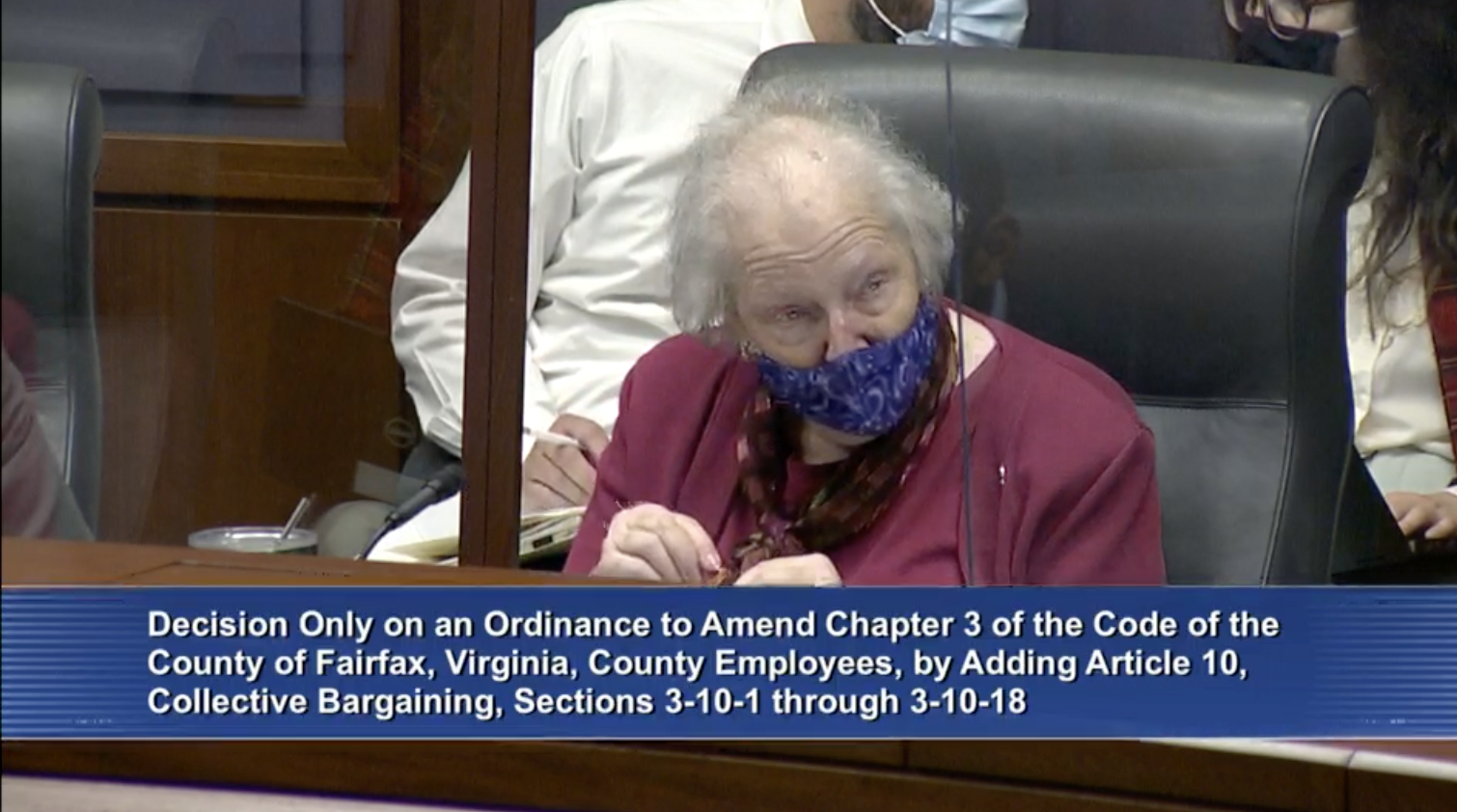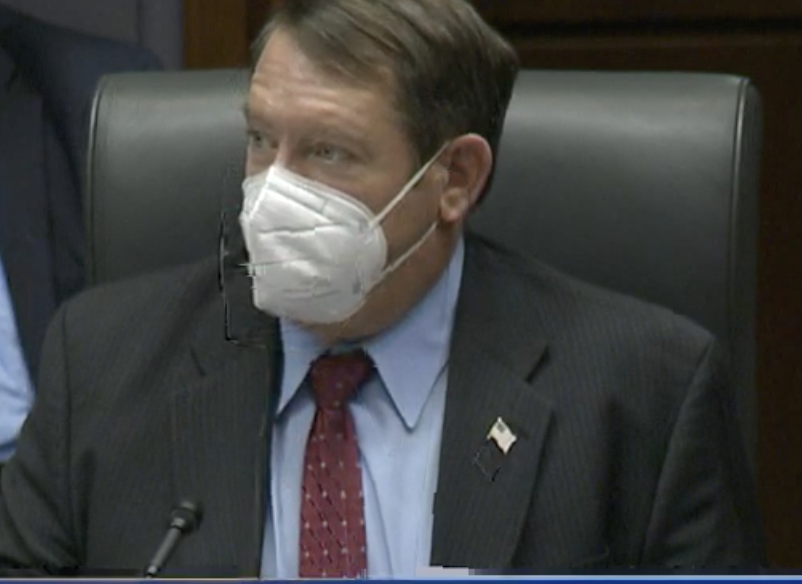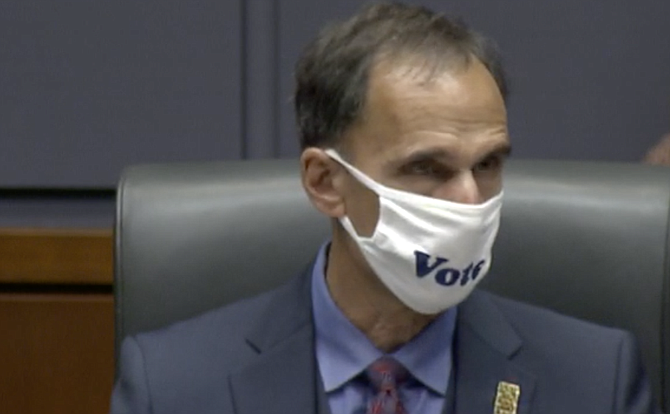"Our county employees are hardworking individuals," said Chairman Jeffrey C. McKay (D), Fairfax County Board of Supervisors. "They are why our county services are outstanding, why people want to live here, and why our economy is thriving."
 Chairman, At-Large - Jeffrey C. McKay (D) Fairfax County Board of Supervisors. “This is a historic day in the County … We're going to have conversations with our employees to improve the County. And it's a day that our County employees should rest assured that board members don't have to say they support county employees. They can actually show it.”
Chairman, At-Large - Jeffrey C. McKay (D) Fairfax County Board of Supervisors. “This is a historic day in the County … We're going to have conversations with our employees to improve the County. And it's a day that our County employees should rest assured that board members don't have to say they support county employees. They can actually show it.”
Referencing the Board's pending decision Tuesday evening on the Ordinance to Amend Chapter 3 of the Code of the County of Fairfax, Virginia, County Employees, by Adding Article 10, Collective Bargaining, Sections 3-10-1 through 3-10-18, McKay said he knew that some people had been concerned about unions involvement in the process. All of the unions were involved, McKay said. "Twenty groups…had an opportunity every minute of every day to contact any one of us and talk about the issue."
McKay said that the ordinance before them was "a compromise" that would help the County retain, attract and recruit the best employees. Concerns raised about keeping management rights were unfounded. "Frankly, most of the things that are in here are things we would do anyway; that this Board has done anyway … So the idea that the sky is falling, and the world is changing, and the County will never be the same; it's nonsense."
McKay urged individuals to read "the actual words" [in the document]. "We're merely putting them in writing and having a contract with our employees so that they know what the fair rules of engagement are and how they can make sure that they continue to work for one of the best employers in the region."
McKay stressed this was "a collective bargaining ordinance," not a "collective bargaining agreement." Many things still need to be worked out. Approving the ordinance allows Fairfax County to go to the next step and work on establishing the agreement, something county employees had been asking for a very long time, McKay said. The General Assembly enabled this action in 2020.
"I am happy with this compromise,” McKay said. I think it puts our employees in a good place, but I think it also allows the county board to have authority over so many of the things … others elected us to do in running the county government."
 Vice Chairman Penelope A. Gross (D- Mason) “Our employees can bring to us their concerns about how they are, what's going on, and also their solutions … Now we're going to be able to do that in a formal agreement.”
Vice Chairman Penelope A. Gross (D- Mason) “Our employees can bring to us their concerns about how they are, what's going on, and also their solutions … Now we're going to be able to do that in a formal agreement.”
Herrity said that issues with collective bargaining agreements transcend public entities, whether the police, fire department, or general county employees. "I think it will be bad for Fairfax County residents and employees."
Herrity said in his private and public sector work as a chief finance officer, they "live and die off recruiting and retention."
"We are in a period of the 'Great Resignation," Herrity said. "This … is going to hurt our ability to be flexible and offer things like signing bonuses … The final turn of the document did eliminate the County's sole authority to hire, promote, fire, transfer, discipline our employees. … I'm really concerned about binding arbitration."
 Supervisor Pat Herrity (R-Springfield) “I'm going to remind you when this goes to arbitration and costs our residents dearly. I'm going to remind you when we have issues with bad employees. Trust me, I'm going to remind you. I'm not going to be supporting this.”
Supervisor Pat Herrity (R-Springfield) “I'm going to remind you when this goes to arbitration and costs our residents dearly. I'm going to remind you when we have issues with bad employees. Trust me, I'm going to remind you. I'm not going to be supporting this.”
Tammie Wondong is a 32-year county employee and President of the Fairfax Chapter of SEIU [Service Employees International Union] Virginia 512. It is a diverse union of more than 2,000 general county employees. Its members are nurses, social workers, mental health professionals, librarians, parks staff, sanitation workers, maintenance workers, engineers, and more who pushed for meaningful collective bargaining.
"Tonight's extraordinary victory is the direct result of working people joining together in our union and pushing for transformative change. This ordinance protects workers, strengthens public services, and benefits every single member of the Fairfax community. Our union is thrilled and looks forward to working in collaboration with the County to make Fairfax an even better place to live, work, and play," said Wondong.
Only as of May 1, 2021, when the Virginia General Assembly granted local government employers the right to decide their course of action regarding collective bargaining could Virginia cities, towns, counties and school boards including Fairfax County pass such an ordinance or resolution. After a forty-four-year ban, Virginia's collective bargaining law allows for recognizing unions or employee associations as the exclusive bargaining representatives for specific segments of their workforces.
Code of Virginia
Title 40.1. Labor and Employment » Chapter 4. Labor Unions, Strikes, Etc. » Article 2.1. Collective Bargaining for Governmental Employees » § 40.1-57.2. Collective bargaining § 40.1-57.2. Collective bargaining.
§ 40.1-57.2. Collective bargaining.
A. No state, County, city, town, or like governmental officer, agent, or governing body is vested with or possesses any authority to recognize any labor union or other employee association as a bargaining agent of any public officers or employees, or to collectively bargain or enter into any collective bargaining contract with any such union or association or its agents with respect to any matter relating to them or their employment or service unless, in the case of a county, city, or town, such authority is provided for or permitted by a local ordinance or by a resolution. Any such ordinance or resolution shall provide for procedures for the certification and decertification of exclusive bargaining representatives, including reasonable public notice and opportunity for labor organizations to intervene in the process for designating an exclusive representative of a bargaining unit. As used in this section, "county, city, or town" includes any local school board, and "public officers or employees" includes employees of a local school board.
B. No ordinance or resolution adopted pursuant to subsection A shall include provisions that restrict the governing body's authority to establish the budget or appropriate funds.
C. For any governing body of a county, city, or town that has not adopted an ordinance or resolution providing for collective bargaining, such governing body shall, within 120 days of receiving certification from a majority of public employees in a unit considered by such employees to be appropriate for the purposes of collective bargaining, take a vote to adopt or not adopt an ordinance or resolution to provide for collective bargaining by such public employees and any other public employees deemed appropriate by the governing body. Nothing in this subsection shall require any governing body to adopt an ordinance or resolution authorizing collective bargaining.
D. Notwithstanding the provisions of subsection A regarding a local ordinance or resolution granting or permitting collective bargaining, no officer elected pursuant to Article VII, Section 4 of the Constitution of Virginia or any employee of such officer is vested with or possesses any authority to recognize any labor union or other employee association as a bargaining agent of any public officers or employees, or to collectively bargain or enter into any collective bargaining contract with any such union or association or its agents, with respect to any matter relating to them or their employment or service.
1993, cc. 868, 879; 2020, cc. 1209, 1276.